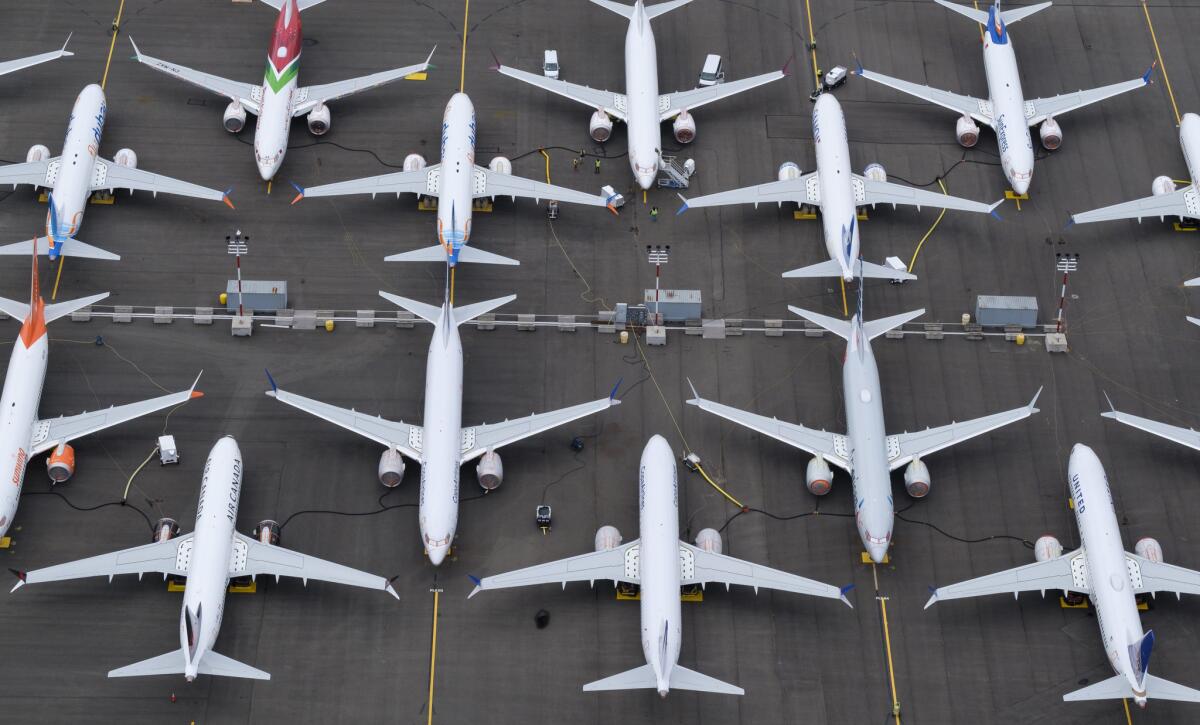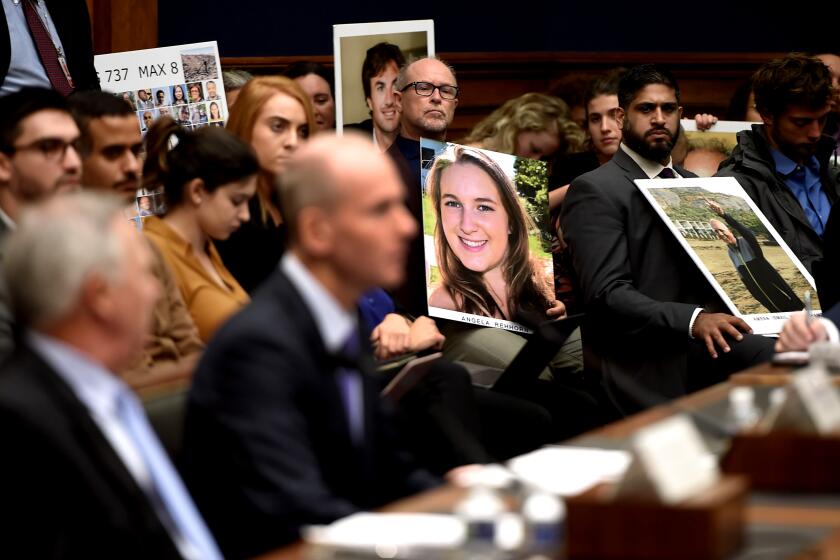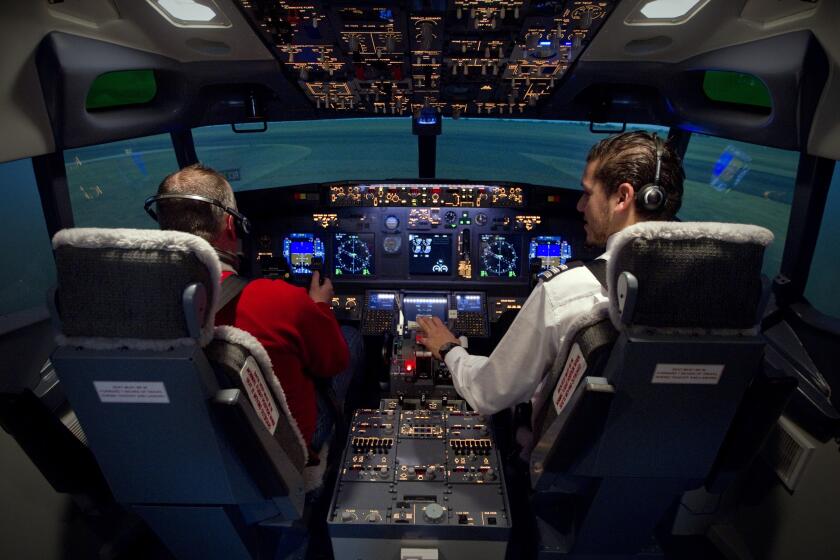Internal Boeing messages say 737 Max was ‘designed by clowns’

- Share via
Boeing Co. employees expressed alarm with the 737 Max and the flight simulators used to train pilots on the new jetliner while also mocking senior managers and regulators, in a trove of messages released by the manufacturer late Thursday.
“This airplane is designed by clowns, who in turn are supervised by monkeys,” one company pilot said in messages to a colleague in 2016. The company provided the documents in December to lawmakers and the U.S. Federal Aviation Administration, who are investigating the 737 Max and the process that cleared it to fly.
The internal communications threaten to upend Boeing’s efforts to rebuild public trust in the 737 Max, which has been grounded since March after two crashes that killed a total of 346 people. That will add to the hurdles for David Calhoun, a longtime board member who will take over Monday as chief executive after Dennis Muilenburg was ousted last month.
“These newly released emails are incredibly damning,” said Rep. Peter DeFazio, an Oregon Democrat who chairs a committee that is investigating Boeing and the Max.
“They paint a deeply disturbing picture of the lengths Boeing was apparently willing to go to in order to evade scrutiny from regulators, flight crews, and the flying public, even as its own employees were sounding alarms internally,” DeFazio said in a statement.
Later in the day, he and other lawmakers spoke of plans to rein in the authority Congress granted the plane maker to oversee some of its own work.
Boeing, which provided the documents under pressure from U.S. lawmakers, apologized and said it was committed to “full transparency” with the FAA.
“These documents do not represent the best of Boeing,” Greg Smith, the company’s interim chief executive, said in a message to employees Friday. “The tone and language of the messages are inappropriate, particularly when used in discussion of such important matters, and they do not reflect who we are as a company or the culture we’ve created.”
The FAA said it has reviewed the Boeing messages and found that “nothing in the submission pointed to any safety risks that were not already identified as part of the ongoing review of proposed modifications to the aircraft.”
Boeing shares fell 1.9% on Friday, the biggest drop in the Dow Jones industrial average. The stock climbed 1.5% on Thursday after Western authorities said a 737 crash in Iran this week was caused by a missile, not mechanical failure. Through Thursday, the shares had dropped 6.4% since the first Max crash in October 2018, while the Dow advanced 17%.
Southwest Airlines Co., the largest Max operator, called the messages “disappointing” but said it remained confident in the work Boeing has done since the statements were made.
“As we’ve shared previously, we will not introduce the Max back into our fleet until it’s safe to fly,” said Brandy King, a Southwest spokeswoman. “We continue to make our procedures, training, and maintenance part of the path and dedicated focus for return to service.”
The Boeing documents — consisting of more than 100 pages of messages, emails and memos — were released days after the company reversed its earlier opposition to requiring Max pilots to undergo simulator training before the grounded plane resumes commercial flight.
U.S. airlines are struggling to secure flight simulators for Boeing’s 737 Max.
One of the company’s big selling points with customers had been that pilots certified for an earlier generation of 737 jets only needed a short computer course to brush up their skills for the Max. Those assurances helped make the Max Boeing’s top-selling jetliner.
The messages shared by the company, at times, reveal the pressure on employees — and customers — to avoid the additional training. They also highlighted the technical glitches that bedeviled Max simulators after the jet began flying commercially in mid-2017. Boeing said that “any potential safety deficiencies identified in the documents have been addressed.”
In one exchange about the Max flight simulators, an employee said: “Honesty is the only way in this job — integrity when lives are on the line on the aircraft and training programs shouldn’t be taken with a pinch of salt. Would you put your family on a MAX simulator trained aircraft? I wouldn’t.”
Smith, the interim Boeing CEO, reminded employees Friday to remain professional in their interactions. “Notwithstanding the inappropriate tone and content of some of these communications, we have examined these issues closely and remain confident in our regulatory processes relating to the Max airplane and simulators,” he said.
The missives were drafted by a small number of employees, primarily technical pilots and personnel working to develop and qualify the Max simulators, a Boeing official said by email. Although all names were redacted, the company confirmed that some involved are the “same individuals” behind incendiary emails revealed last year.
In messages disclosed in October, Mark Forkner, the former 737 Max chief technical pilot, bragged of employing “Jedi mind tricks” on regulators and described problems in a 737 Max simulator. In instant messages, Forkner told a colleague that new software on the Max called the Maneuvering Characteristics Augmentation System, or MCAS, was “running rampant in the sim on me,” referring to simulator tests of the aircraft. “Granted, I suck at flying, but even this was egregious.”
Those messages, shared early last year with federal investigators — but not the FAA — sparked fury among lawmakers who later unloaded on Muilenburg during congressional hearings that followed their release.
The latest batch of communications includes a 2017 email in which someone identified as the chief technical pilot on the 737 crowed to Boeing colleagues, “Looks like my jedi mind trick worked again!” Attached was a forwarded email exchange in which the person warned an unnamed recipient against offering simulator training for Max pilots, pushing instead for the computer-based course that regulators had already approved for flight crews transitioning to Max from earlier 737 models.
“I am concerned that if [redacted] chooses to require a Max simulator for its pilots beyond what all other regulators are requiring that it will be creating a difficult and unnecessary training burden for your airline, as well as potentially establish a precedent in your region for other Max customers,” the Boeing pilot wrote in the forwarded message.
An unidentified Boeing employee in a different text message exchange brags about swaying India’s regulator “to make them feel stupid about trying to require any additional training requirements.”
Added the sender: “I just Jedi mind tricked this fools. I should be given $1000 every time I take one of these calls. I save this company a sick amount of $$$$.”
In another 2017 email, the 737 chief technical pilot again pushed back against simulator training for pilots transitioning from the older 737 NG family to the Max. “Boeing will not allow that to happen. We’ll go face to face with any regulator who tries to make that a requirement,” the pilot wrote.
In a 2013 memo, an employee discussed MCAS, the new tech on the Max that would later be implicated in both crashes. The new system — which wasn’t disclosed to pilots — activated accidentally and overwhelmed a Lion Air flight crew in 2018 and Ethiopian Airlines pilots last year. Both planes crashed, killing everyone aboard.
In the memo, the employee recommended describing MCAS as an addition to an existing speed trim system instead of as a new feature. “If we emphasize MCAS is a new function there may be greater certification and training impact.”
In a memo on June 1, 2018, an employee vented about a culture in which managers only give lip service to quality. The sender was warning that Boeing might not be granted an extension to fix the Max simulator at London’s Gatwick airport, which would put the device at risk of losing its qualification.
“We put ourselves in this position by picking the lowest cost supplier and signing up to impossible schedules. Why did the lowest ranking and most unproven supplier receive the contract? Solely based on bottom dollar. Not just MAX but also the 777X!”
Added the employee: “I don’t know how to fix these things... it’s systematic. It’s culture. It’s the fact that we have a senior leadership team that understand very little about the business and yet are driving us to certain objectives. Its lots of individual groups that aren’t working closely and being accountable. It exemplifies the ‘lazy B’ ” — the nickname the person used for Boeing.
Supplier layoffs
Also on Friday, Spirit AeroSystems Holdings Inc., Boeing’s largest supplier for the grounded 737 Max, said it was laying off 2,800 employees, potentially complicating the future of the plane.
Spirit said the job cuts are needed to reduce costs as Boeing prepares to halt output of the Max indefinitely.
The move signals that Spirit, which makes 70% of the narrow-body jet’s structure, expects a lengthy suspension in production. It currently has 100 Max shipsets in storage.
The layoffs will hit workers at factories in Kansas and Oklahoma. Employees could be recalled in the future if Max production rises enough, Spirit’s CEO said.
No severance for ex-CEO
Ousted Boeing CEO Muilenburg will not receive any severance pay, doesn’t get a 2019 bonus and has forfeited stock awards worth tens of millions of dollars, the company said Friday in a regulatory filing.
The unvested equity awards he forfeited could have been worth as much as $31 million if certain targets had been exceeded, the company said.
Still, he gets to keep awards and stock options that had already vested, along with his pension and deferred pay — totaling as much as $80.7 million, according to calculations by Bloomberg. By contrast, Boeing set aside $50 million to compensate the families of crash victims.
Proposed fine
The Federal Aviation Administration on Friday proposed a $5.4-million civil penalty against Boeing for misrepresenting the safety of wing components installed on 178 of its 737 Max airplanes.
The parts, known as slat tracks, guide movable panels on the leading edge of the wing to provide extra lift during takeoff and landing. The FAA said Boeing asserted that the parts met safety standards when they didn’t.
The proposed levy comes on top of an earlier proposed fine of roughly $3.9 million for Boeing’s alleged installation of the same faulty components on some 133 copies of its 737 NG plane, which preceded the Max.
Boeing said it is “working closely with our customers to take the appropriate corrective actions.”
Johnsson and Beene write for Bloomberg.
More to Read
Inside the business of entertainment
The Wide Shot brings you news, analysis and insights on everything from streaming wars to production — and what it all means for the future.
You may occasionally receive promotional content from the Los Angeles Times.












